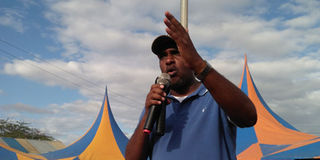Premium
Suleiman Dori: Death mutes Parliament's 'Kiswahili warrior'

Msambweni MP Suleiman Dori during a past event. He made all his contributions in Kiswahili. PHOTO | FILE | NATION MEDIA GROUP
What you need to know:
- Patterns in his contributions to various motions in the National Assembly reveal a man who loved to speak on issues affecting ordinary people and courted controversy in equal measure.
Although he had no Bill to his name, according to the Parliament website, Suleiman Dori loved Kiswahili and made all his contributions to debates in the East African lingua franca.
Patterns in his contributions to various motions in the National Assembly reveal a man who loved to speak on issues affecting ordinary people, and who courted controversy in equal measure.
According to Mzalendo, a lobby that keeps an eye on Kenya's Parliament with a mission to facilitate public participation in House processes, in 2018 Mr Dori spoke five times on the floor, three times in 2017 and 2016, six times in 2015, four times in 2014 and just once in 2013.
His choice of Kiswahili seems to have been informed by his desire to connect with his constituents and coastal people who mostly speak the language.
Chairman of the House Transport Committee David Pkosing (Pokot South), where Dori served as a member, described the MP as a very active member who never missed committee sittings.
“It is very sad that we have lost him; he even attended a committee sitting last week and he looked ok. He used to ask very useful questions and would do follow-ups,” Mr Pkosing told the Nation.
The chairman of the Coast Parliamentary Group occasionally held meetings at Parliament's cafeteria.
CONTRIBUTIONS
The Nation extracted some of his House contributions which were all done in Kiswahili.
In 2014, while contributing to a motion by Taita-Taveta Woman Representative Joyce Lay seeking to progressively translate laws passed in both national and county assemblies into Kiswahili, he had this to say:
“Many Kenyans understand Kiswahili. As leaders, it is therefore important to take this motion seriously. A good example is the differences that emerge between motions drafted in English and Kiswahili,” he said.
“At the grassroots, Kenyans watch TV in large numbers when Bills are debated in Kiswahili. Therefore, I want to appeal to my fellow leaders, let us give this motion priority for Kiswahili to be firmly established in this country.”
Standing Order 77 states that all proceedings of the House shall be conducted in Kiswahili, English or Kenya Sign Language.
The second part of the order demands that a member who begins a speech in any of the languages provided under paragraph (1) shall continue in the same language until the conclusion of the speech.
“I recently visited the National Council for Law Reporting offices. I was surprised to find that we do not have an official translated Kiswahili Constitution,” Ms Lay said while moving the motion.
“This is worrying because Chapter One of the Constitution talks about sovereignty of the people. The electronic version of the official ''Hansard'' report is for information purposes only. A certified version of this report can be obtained from the Hansard Editor,” she said while moving the motion.
In 2014 while contributing to a motion on the annual report on the state of security in Kenya, Mr Dori said:
“As leaders, it is our responsibility to protect Kenyans. Let’s not convene here weekly to talk about issues that don’t add value to Kenyans. Kenyans elected us. Kenyans have faith in their leaders and we must work for them,” he said.
“The closed mosques are houses of worship, which must be respected … My request to the government run by President Uhuru is to focus on matters security.”
OPPOSED NASA LIST
In November 2017 after the General Election, Mr Dori was among Coast lawmakers who opposed the Nasa House leadership list, saying it favoured people from Nyanza.
He claimed Coast had been left out of the line-up yet the region supported the Raila Odinga-led coalition.
“I’m opposed to this list. First of all, gender balance has not been factored in. Secondly, it is clear that the leadership of the party has been selected from Nyanza as other regions are ignored,” he said.
“The coalition rules and procedures were not followed. The members are supposed to be called to a parliamentary group meeting. This did not happen,” he added.
“As the chairman of the Coast MPs forum, I reject this list … we will resist just like they are resisting (Uhuru Kenyatta’s election victory).”





